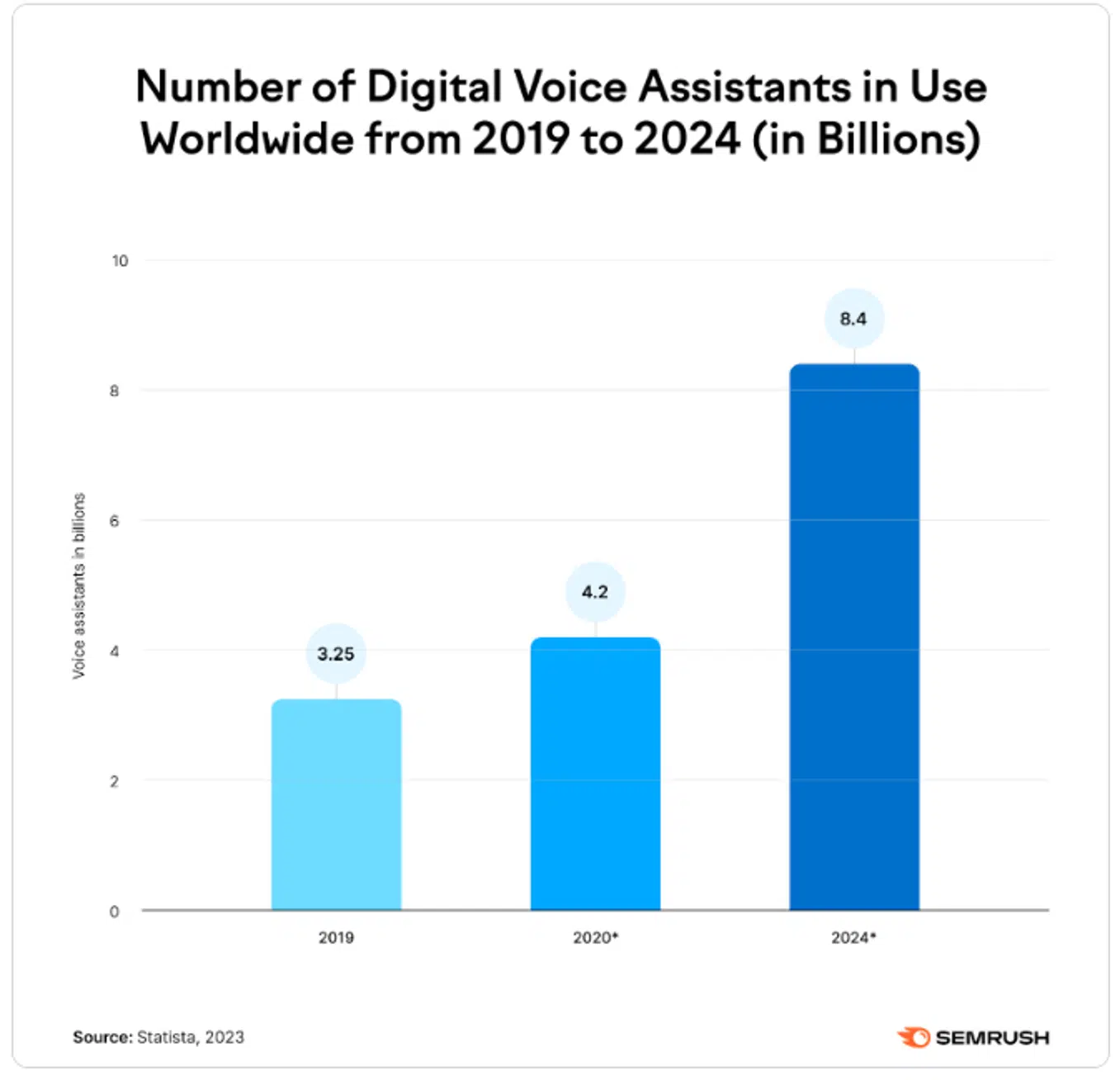“Okay, Google. What is voice search?”
“Hello, Trish. Voice search means optimizing your website for voice search queries. The goal of voice search optimization is to increase the likelihood that your content will appear in voice search results. That’s it.”
If you had asked me about voice search a year ago, I would have thought of an Alexa Echo or Google Home device. Right now, all I can think about is talking out loud into a nearby device.
Even taking notes on this article using my phone, watch, voice assistant, or browser now makes me want to talk more.
Evolution of voice search
When we think about how voice search will be used in the future, we need to focus on how the next generation is using voice search, not necessarily how I'm using it.
A friend of mine who has kids told me that their kids use voice for most things. They're not just asking Alexa or Google Assistant (or Gemini). They're asking questions by talking to their smartwatches or nearby devices.
As ChatGPT and other apps roll out voice search, people will become more comfortable using voice for queries. As mentioned in “ChatGPT Deploys Audio and Image Prompts”, people are likely to participate and use his ChatGPT on a daily basis.
So what do you think this means for voice search? Will it matter in 2024? How do you know if it's working if you don't actually have access to the data? ?
I think the data will come. The key is for marketers to prepare for that change.
Adopting voice search
According to Statista, more than 25% of individuals in Western countries said they use a digital voice assistant several times a day.
This can affect voice search functionality in a number of ways, including:
- More audio data allows voice assistants to analyze natural speech patterns to better understand search queries. Although there have been complaints about inaccuracies, we are already seeing improvements with more data and adoption.
- Voice assistants learn your personal tone, words, and phrases used in dictation, enabling more personalized and contextual voice searches. Search results are more personal.
- As people become more accustomed to speaking long content, they may be encouraged to use more conversational long-form queries in voice search, rather than just short commands.
- Long-form queries can be found in GSC or other tools. This allows the site to know what it needs to answer.
- People will come to expect voice assistants to understand the context and intent behind their queries based on past conversations, increasing their expectations for results. When problems occur, confidence in the results can be undermined. Results become more personal and confidence can easily be lost.
By 2024, there will be 8.4 billion voice assistants. That's more than the world's population.


Over the past few years, advances in voice search have changed the way we interact with our devices and the web. Now you can ask questions and search just by speaking to your smartphone, smart speaker, smartwatch, or even your desktop computer.
Voice search is changing due to technological advancements that are impacting the industry.
Young users (alpha generation)
Younger users are using voice more often to find answers. They use it to navigate the internet and interact with technology. This is due to the easy and quick use of voice commands and the increasing number of smart devices in everyday life.
They also often use voice search to quickly access information such as homework help, random facts, and simple answers in everyday conversations.
They expect immediate reactions, seeking both instant gratification and efficiency. It can also be used as an interactive learning aid, helping to engage and support students outside of the classroom.
Voice assistants also offer interactive games, storytelling, and other entertainment options. Other uses include:
- Things to do every day.
- social interaction.
- Create custom experiences like playlists and games based on your previous activity.
Voice search allows users to find information or perform tasks without interrupting their current activity. Snap also has bots that you can talk to.
Young users are embracing voice search and voice-assisted technology as a natural and efficient way to access everything from education to entertainment to managing their daily lives. It's the next step to becoming a digital native (voice native?). No keyboard or monitor required.
The introduction and innovative use of new technologies will change the way content is delivered and lead to a future where voice interactions are further integrated into digital experiences.


change user behavior
This all leads to more natural interactions. Improvements in natural language processing enable longer conversations between users and voice assistants/voice search.
As voice moves toward more conversational tones and complex queries, search engines must adapt to interpret more nuanced questions and provide results.
This natural feel encourages regular use. And you need to be able to create/optimize your content for those results.
Voice search is useful, especially when you're on the go and need hands-free functionality.
Speaking is faster than typing and is attractive when users want quick answers or multitask. However, typing will continue to be important in public spaces and workplaces.
Some people prefer to type to maintain their privacy or avoid bothering others. Typing is more discreet and should be used in places where speaking out loud is not ideal.
Impact of voice search
I think voice search will start to change the SEO landscape.
Keywords are becoming more conversational, and report results now show longer, long-tail keywords, or full text. This means providing answers to local searches, FAQ-style results, or other articles.
Voice search has also improved accessibility for people with visual impairments and other disabilities, allowing them to access information more easily.
Looking to the future
The future of voice search looks promising, with continued advances in AI and technology expected to make voice search even more intuitive and integrated into everyday life.
As voice search becomes more integrated into consumer behavior, the industry will continue to evolve and adapt to the changing landscape of digital interaction and connectivity.
AI continues to drive further innovation in search technology, bringing deeper integration into daily life and tasks and more personalized experiences. It's redefining the limits of what voice-activated systems can accomplish.
The rise and importance of voice search requires marketers to deliver content that drives results for their business and clients. Still, it's hard to know whether what's being done is working because results are difficult to track.
We cannot ignore it and must try to adapt to it. You may or may not see tools like ChatGPT providing citations. Users use voice search to get quick answers and visit sites when they want more detailed information than a quick answer or generated summary.
While voice search seems to be changing the internet, at least in my opinion, what makes quality sites and information hasn't changed all that much. Access methods have changed, but what provides a great user experience remains the same.
Good voice search optimization equals good SEO. Best practice rules remain. Searchers want quick access to accurate, reliable information that answers their questions.
The opinions expressed in this article are those of the guest author and not necessarily those of Search Engine Land. Staff authors are listed here.


